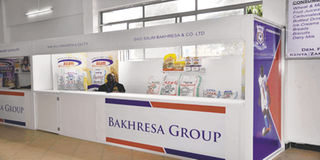Bakhresa buys Zimbabwe’s second largest food company

Said Salim Bakhresa & Company Limited’s reception in Dar es Salaam. The company will take over Zimbabwe’s second largest food company in December. PHOTO | FILE
What you need to know:
TanzaniaInvest.com reported that a meeting held on September 2, 2015 concluded with the endorsement of the deal and now Bakhresa is expected to immediately inject $18 million to pay off creditors a debt of $29.4 million.
Dar es Salaam. Family-owned Said Salim Bakhresa & Co Ltd has set aside $40 million to take over Zimbabwe’s second largest food and milling company, Blue Ribbon Industries Limited (BRI).
TanzaniaInvest.com reported that a meeting held on September 2, 2015 concluded with the endorsement of the deal and now Bakhresa is expected to immediately inject $18 million to pay off creditors a debt of $29.4 million.
Workers will also be paid off since through an employee share ownership trust, they owned 10 per cent of the company and will receive 15 per cent of the total stake’s value as the company was already insolvent.
On the other hand, the remaining balance of $32 million will be invested over a period of five years to replace old equipment and acquire raw materials.
According to BRI judicial manager, Mr Reggie Saruchera, the company needs between $10 million and $15 million worth of raw materials such as maize and wheat to run operations at 100 per cent capacity.
Bakhresa, which will assume the total control of BRI by December 2015, is expecting to raise BRI’s capacity utilisation from approximately 35 per cent to the desired 100 per cent by the end of the five year period, since according to its Vice President, Mr Ramesh Kumar, BRI needs to operate at a minimum capacity of 60 per cent for good margins.
Bakhresa aimed to acquire BRI when it was put into final administration in 2013 after the company collapsed in 2012 due to a cash shortage that didn’t let it meet its short term obligations with creditors.
Indigenisation approvals by the Zimbabwean government delayed the process since it only approved the 75 per cent stake to Bakhresa in 2015, dismissing a maximum foreign-ownership in local firms of 49 per cent.
According to Bloomberg, Bakhresa faced a strong resistance by competitors to its plans to own more than the limit established, beating South African Grindrod and Zimbabwean Takura Capital, which proposed to inject only $8.5 million and $7.5 million respectively.




